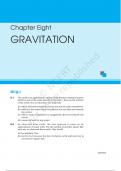Exam (elaborations)
FIGURE 8–3 The gravitational force between any two bodies varies directly as the product of their masses and inversely as the square of the distance between them.
FIGURE 8–3 The gravitational force between any two bodies varies directly as the product of their masses and inversely as the square of the distance between them.
[Show more]



